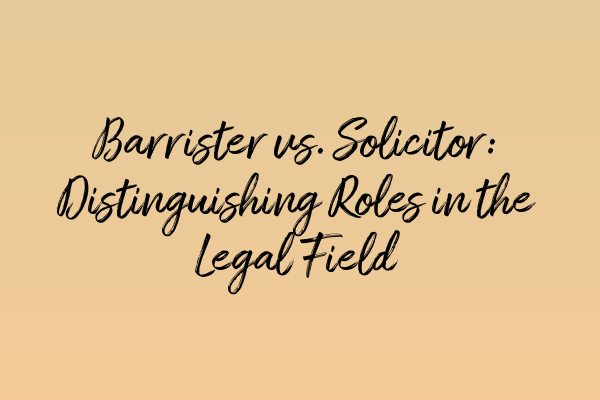Barrister vs. Solicitor: Distinguishing Roles in the Legal Field
Introduction: Understanding the Legal Field
The legal field is a complex and multifaceted industry with various roles and responsibilities. Two key professionals within this industry are barristers and solicitors. Although they work closely together, their roles and responsibilities differ significantly. In this blog post, we will explore the key distinctions between barristers and solicitors, and shed light on the unique functions they perform to provide legal services to their clients.
What is a Barrister?
A barrister is a legal professional primarily involved in advocacy and the representation of their clients in court. Barristers are experts in specific areas of law and are often instructed by solicitors to provide specialist advice or representation in court proceedings. They undergo rigorous training and belong to the independent Bar Council, which regulates their profession.
Barristers: Training and Expertise
The journey to becoming a barrister starts with obtaining an undergraduate degree in law. Subsequently, aspiring barristers must complete the Bar Professional Training Course (BPTC), which equips them with practical skills necessary for legal practice. Furthermore, they must complete a period of pupillage, where they shadow experienced barristers and gain valuable courtroom experience.
Barristers: Advocacy and Court Representation
Barristers have a unique role in the legal system, as they are primarily responsible for courtroom advocacy. They provide expert legal advice, draft legal documents, and represent their clients in various court proceedings, including trials and appeals. Their expertise lies in presenting persuasive arguments and cross-examining witnesses. Their ability to analyze complex legal issues and present them effectively in court is unparalleled.
What is a Solicitor?
Solicitors, on the other hand, are legal professionals who primarily provide advisory and transactional services to their clients. They work directly with clients, offering legal advice, drafting legal documents, and negotiating on their behalf. Unlike barristers, solicitors have direct contact with clients and are often the first point of contact for legal assistance.
Solicitors: Education and Training
To become a solicitor, individuals must obtain an undergraduate law degree followed by the completion of the Legal Practice Course (LPC). Furthermore, aspiring solicitors must complete a two-year training contract with a solicitor’s firm. During this period, they gain practical experience in various areas of law and further develop their legal skills.
Solicitors: Advisory and Transactional Services
Solicitors are known for their expertise in providing legal guidance and advice to clients. They assess individual legal issues, conduct legal research, draft contracts and agreements, and negotiate on behalf of their clients. They also handle the administrative aspects of legal matters, such as filing documents and managing legal processes.
Collaboration and Complementary Roles
Barristers and solicitors work hand in hand to provide comprehensive legal services to their clients. Solicitors are often the first point of contact for individuals seeking legal assistance. They assess the client’s needs, provide initial legal advice, and, if necessary, engage a barrister for specialized courtroom representation.
The collaboration between barristers and solicitors ensures that the client receives the best possible legal representation and advice. While barristers excel in court advocacy and specialist legal knowledge, solicitors manage the overall legal process and maintain direct communication with clients throughout.
Conclusion
In conclusion, while barristers and solicitors are both legal professionals, their roles in the legal field differ significantly. Barristers specialize in advocacy and courtroom representation, whereas solicitors provide advisory and transactional services to their clients. By working together, barristers and solicitors offer comprehensive legal assistance to individuals, ensuring they receive the best legal representation throughout their legal journey.
If you are interested in learning more about the legal field, we recommend checking out these related articles:
– Private Prosecutions: Exploring Non-Governmental Prosecutions in Criminal Cases
– Demystifying Criminal Law Procedures: A Step-by-Step Guide
– Rights of the Accused: Protecting Individual Liberties in Criminal Proceedings
– Magistrates’ Court vs Crown Court: Understanding Key Differences
– Protecting Vulnerable Witnesses in Criminal Trials: Best Practices and Legal Safeguards
These articles will provide further insights into various aspects of criminal law and legal procedures, helping you navigate the legal system with confidence.


Leave a Reply